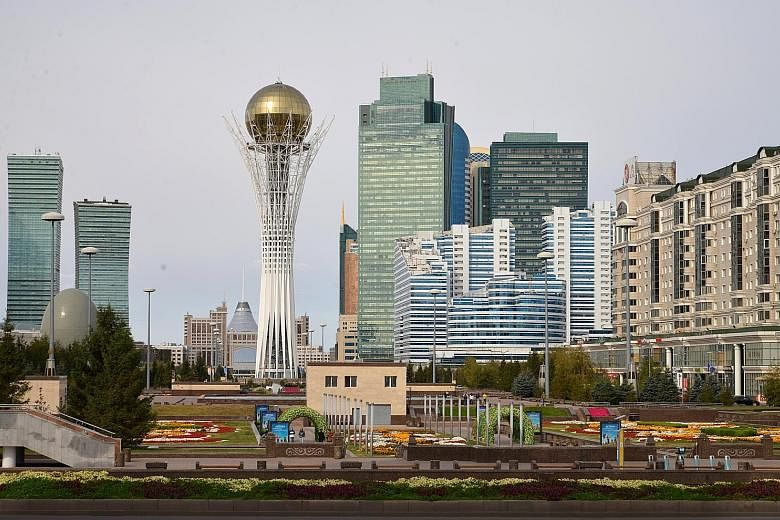This city is 18, with none of the awkwardness that you associate with teenagers.
Its colours are loud. Its buildings catch the eye. It calls attention to itself - much like the man who spawned Astana.
It would be too much to say that Mr Nursultan Nazarbayev single- handedly put Kazakhstan and its capital on the map. Its sheer size would have guaranteed that. At 2.7 million sq km, it is larger than all of Western Europe, though its population density is so low that, had it been the size of Bishan town, it would have housed only 50 people.
What Mr Nazarbayev has done is to ensure that a nation, whose most famous fictional citizen is Borat, constantly reinvents itself to the point where its people are as wealthy as Malaysians.
Next year, this land known for its herdsmen, nomads and more than 2 million horses (some of which end up on the dinner table) hopes to launch a financial centre to reel in US$40 billion (S$54 billion) by 2025.
Considering that the Kazakhs are barely familiar with the grammar of stock trading, this seems ambitious. But the land has been allocated, investors have studied the plans and no one has ever accused Mr Nazarbayev of shirking a challenge.
Now pushing 76, this former steelworker is the only leader and President this nation has known in its 25 years. He scooped up 98 per cent of the vote in the last presidential election. The mandate lets him set a direction that he expects his 17 million compatriots to follow.

It is a right that his acolytes say he has earned.
"He is not just our first President. He is the man who founded our nation," says the chairman of senate of parliament, Mr Kassym Jomart Tokayev, who ranks behind only Mr Nazarbayev in the hierarchy.
When the former Soviet Union imploded, spewing new republics like so much space debris, it was left to Mr Nazarbayev to fashion a nation from what had been a barren, endless carpet of steppes punctuated by craters where the Soviets tested their nuclear arsenal.
First, he ensured stability by immediately settling all border issues with China and Russia. In addition, on a night lubricated with vodka at the hunting lodge of Russian leader Boris Yeltsin, he famously sketched a map on a table napkin to hammer out an oil rights agreement with its northern neighbour.
Chevron was roped in to tap the country's oil reserves and get the first trickle of prosperity flowing. Across its vast canvas, a road network is starting to link western China to western Europe and a country is taking its place in the sun.
Not every box has been ticked. "In the 1990s there was no food, no heat, no currency and terrorism problems at our doorsteps," said the President. "Then along would come (Western) representatives talking about democracy."
Instead, he presented them with a decision for which he alone was responsible, a more central capital city to replace the mountain-ringed Almaty that sat 300km from China.
The presidential palace is a grander version of the White House. From there, the Kazakh leader has a panoramic view of tessellated gardens, brash new malls, the obligatory victory monument, both houses of Parliament and apartment blocks that house his legislators.
"Helps him keep an eye on things," says a local guide.
In the tallest building that Mr Nazarbayev can see, sits Mr Yernar Nurgaliyev, managing director of the Astana International Financial Centre (AIFC) and fine-tuner of an audacious vision that took shape barely one year ago. Mr Nurgaliyev is a Bolashak scholar.
In 1994, with his coffers running low, the President decided to send 180 of his country's brightest students on fully paid scholarships overseas - asking only that they return to work in Kazakhstan for five years. More than 20,000 students later, the Bolashak - literally, the future - scholars are perched in positions of power as the nucleus steering the country.
AIFC's job is to wean the country away from its dependence on the 1.7 million barrels of oil a day that it churns out, to a place where plunging oil prices would not hobble it.
Some 25ha of land has been set aside for AIFC. Alibaba's Jack Ma and Blackstone's Stephen Schwarzman are being consulted to shape it. The idea is to offer land and predictable laws to attract the top financial players in fields like Islamic finance, fintech, asset management and capital markets.
"English will be the language of the centre," says Mr Nurgaliyev. "We'll bring in international judges and resolve disputes based on English law. Companies will be allowed to pay their staff in euros or dollars."
Even corporate tax will be waived for 50 years. By 2025, the project is expected to add US$40 billion to the Kazakh GDP.
It is a big leap for a country where investment means going to a currency exchange and betting on the movement of the tenge against the dollar. Mr Nurgaliyev counters that is precisely why the country needs to diversify.
Outside his office, the streets are filling up with cars. A short distance away, horsemen still skirt the endless intercontinental highways. It is Astana's job to ensure these ancient nomads do not fall too far behind .

